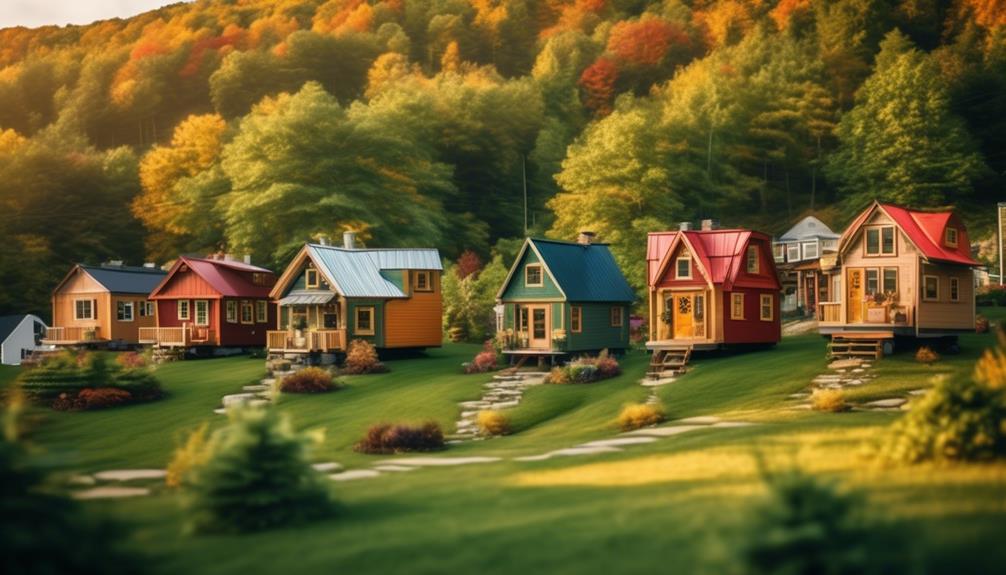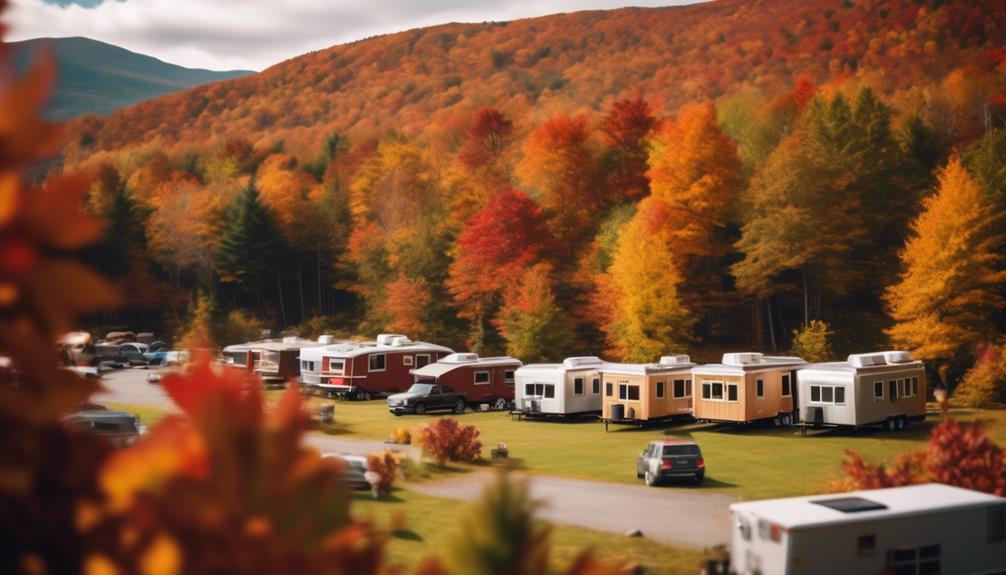Vermont's thriving tiny house movement has gained significant momentum in recent years. This is driven by the state's unique regulations and building codes that cater to sustainable and cost-effective housing options.
While tiny houses on wheels are permitted in Vermont, there are specific requirements and zoning regulations that vary across different cities and towns. Statewide laws in Vermont do not explicitly address tiny houses as legal dwellings, making it more feasible to live in a tiny house in rural areas with less stringent zoning and building laws.
However, major cities in Vermont often consider tiny houses on wheels as recreational vehicles, subject to safety standards. Each county in Vermont has the authority to establish its own building laws. Some counties impose minimum square footage requirements that can pose challenges for those interested in the tiny house lifestyle.
With these factors in mind, it is clear that Vermont's tiny house movement is not without its complexities. This makes it an intriguing subject worth exploring further.
Key Takeaways
- Vermont has specific regulations and building codes for tiny houses, making them legal in the state.
- Local zoning regulations may vary, so it's important to check with the specific city or town regarding tiny house regulations.
- Living in a tiny house is possible in rural areas where zoning and building laws are less strict, but major cities may have stricter regulations.
- Different counties in Vermont have varying regulations regarding tiny houses, and each county has the authority to create its own building laws.
Tiny House Regulations in Vermont
Tiny house regulations in Vermont are specific and require adherence to certain building codes and zoning regulations. Vermont allows tiny houses on wheels as long as they meet certain requirements. However, local zoning regulations may vary, so it's important to check with the specific city or town.
The impact of tiny houses on Vermont's housing market is significant, as the state encourages sustainable and affordable housing options. While Vermont does not have statewide laws specifically addressing tiny houses as legal dwellings, living in a tiny house is possible in rural areas where zoning and building laws are less strict. However, major cities in Vermont may have stricter regulations regarding tiny houses on wheels.
It is important to note that tiny houses on wheels are often considered recreational vehicles and must follow safety standards.
Tiny House Costs in Vermont
The cost of owning a tiny house in Vermont can vary significantly depending on factors such as size, materials used, and level of customization. Here are three key points to consider:
- Price range: Tiny houses in Vermont can range from $20,000 to $100,000. DIY builds tend to be more affordable compared to hiring a builder.
- Additional costs: In addition to the cost of the house itself, there are other expenses to consider such as land, utilities, permits, and maintenance. It's important to budget and plan accordingly.
- Financing options: There are several financing options available for those interested in owning a tiny house in Vermont. These may include personal loans, RV loans, or even crowdfunding. It's recommended to explore different options and choose the one that best suits your financial situation.
Benefits of tiny house living: Tiny houses offer numerous benefits such as affordability, sustainability, and mobility. They allow for a simpler and more minimalist lifestyle, while also promoting a smaller ecological footprint. Additionally, the compact size of tiny houses often means lower utility bills and maintenance costs. Overall, tiny house living offers an innovative and alternative housing solution in Vermont.
Tiny House Friendly Cities in Vermont

Londonderry, Burlington, and Montpelier are among the cities in Vermont that have established zoning regulations and building codes to accommodate tiny houses. These cities recognize the benefits of living in a tiny house in Vermont, such as sustainability, affordability, and the opportunity to simplify one's lifestyle. They may even have designated areas or communities for tiny houses, fostering a sense of community and promoting innovation in housing options. However, it's important to note that each city may have its own specific requirements and restrictions, so it's recommended to research and consult with local authorities before settling in a specific city. Here is a table showcasing some of the tiny house friendly cities in Vermont:
| City | Zoning Regulations | Building Codes | Tiny House Communities |
|---|---|---|---|
| Londonderry | Accommodates Tiny Houses | Specific Requirements | Yes |
| Burlington | Allows Tiny Houses | Specific Requirements | Yes |
| Montpelier | Zoning Regulations | Building Code Standards | No |
These cities are paving the way for the tiny house movement in Vermont, providing opportunities for individuals to embrace a more minimalist and sustainable lifestyle.
Tiny House Builders in Vermont
Cities in Vermont that have embraced the tiny house movement are not only creating zoning regulations and building codes to accommodate tiny houses, but they are also fostering a supportive environment for tiny house builders to thrive. Here are three notable tiny house builders in Vermont:
- Rollen Homes (Townshend, VT): With a price range of $30,000 to $100,000, Rollen Homes offers eight different models of tiny homes. They provide customization options and have a small team of five dedicated workers. Founded by Greg Durocher, a carpenter with a passion for tiny homes, Rollen Homes aims to create affordable and sustainable housing solutions.
- Tiny House Crafters (Londonderry, VT): Founded by the Anderson family nine years ago, Tiny House Crafters offers five starting point designs with custom options. This passion project of a contractor, environmentalist, and architect provides personalized tiny house solutions. Contact information is available on their website for further inquiries.
- Jamaica Cottage Shop (Londonderry, VT): Founded in 1995, Jamaica Cottage Shop offers building kits, plans, and prefabricated tiny homes. They also provide buildings and plans for other infrastructure. With a price range of $1,000 to $36,000, Jamaica Cottage Shop is a busy shop with dedicated employees, builders, and carpenters.
When considering the benefits of tiny house living in Vermont, it is important to acknowledge the affordability and sustainability of these homes. However, there are also challenges and considerations when building a tiny house in Vermont. These include navigating local zoning ordinances, ensuring compliance with building codes, and finding suitable land for placement.
Nonetheless, with the support of tiny house builders and the accommodating environment in Vermont, individuals can embark on their journey towards a simpler and more sustainable lifestyle.
Tiny House Trailer Dealers in Vermont

There are several reputable trailer dealers in Vermont that cater to the needs of individuals looking to purchase trailers for their tiny houses.
One such dealer is Kingdom Equipment & Trailers located in Danville, VT. They offer a range of trailers including cargo, dump, flatbed, and equipment trailers. With a price range of $3,000 to $12,000, they have both new and used trailers available.
Another option is Kaufman Trailers in Vermont Saint Johnsbury, VT, which has over 30 years of experience in selling utility hauling equipment. They offer gooseneck and flatbed trailers suitable for tiny houses, with prices ranging from $7,000 to $19,000.
AJs Truck & Trailer Center in Harrisburg, PA also serves Vermont and offers a wide selection of trailer variations and hauling products, with prices ranging from $4,000 to $9,000.
These trailer dealers provide convenient options for those interested in the advantages of tiny house living in Vermont.
Conclusion
In summary, Vermont offers a range of options for those interested in the tiny house movement, with legal regulations, tiny house friendly cities, and reputable builders and trailer dealers available.
The tiny house movement has had a significant impact in Vermont, providing a solution for affordable and sustainable housing. The advantages of tiny house living include reduced environmental footprint, lower utility costs, and increased flexibility in terms of location and lifestyle.
Vermont's legal regulations allow for the construction and placement of tiny houses on wheels, as long as they meet certain requirements. The tiny house friendly cities of Londonderry, Burlington, and Montpelier have zoning regulations and building codes that accommodate tiny houses, making it easier for individuals to find a place to live.
Additionally, reputable builders such as Rollen Homes, Tiny House Crafters, and Jamaica Cottage Shop provide high-quality and customizable tiny homes. Trailer dealers like Kingdom Equipment & Trailers, Kaufman Trailers, and AJs Truck & Trailer Center offer suitable trailers for hauling tiny houses.
Vermont's thriving tiny house movement is providing innovative solutions for those seeking affordable and sustainable housing options.
Frequently Asked Questions
Are There Any Financial Incentives or Grants Available for Building or Purchasing a Tiny House in Vermont?
Financial assistance and government grants for building or purchasing a tiny house in Vermont are available. These incentives aim to support sustainable and affordable housing options. It is recommended to research and consult with local authorities for specific details and eligibility criteria.
Can I Legally Live in a Tiny House on Wheels Full-Time in Any Counties in Vermont?
Living legally in a tiny house on wheels in Vermont is possible, but it depends on the local zoning regulations. Each county has the authority to create its own building laws, so it's important to research and consult with local authorities for specific requirements.
Are There Any Restrictions on the Size or Dimensions of a Tiny House in Vermont?
There are no statewide size restrictions for tiny houses in Vermont, but local zoning regulations may impose limitations. It is important to research and comply with specific city or town requirements regarding size and dimensions of tiny houses.
Are There Any Specific Requirements for Off-Grid or Sustainable Features in a Tiny House in Vermont?
There are no specific requirements for off-grid or sustainable features in a tiny house in Vermont. However, individuals interested in sustainable heating solutions and eco-friendly building materials can incorporate them into their tiny house design.
Are There Any Resources or Organizations in Vermont That Provide Support or Information for Individuals Interested in the Tiny House Movement?
Vermont offers resources and organizations for individuals interested in the tiny house movement. These include tiny house community events and building workshops, providing support and information to those seeking to join this innovative housing trend.
Conclusion
In conclusion, Vermont has emerged as a favorable location for the tiny house movement due to its accommodating regulations and building codes.
While statewide laws do not explicitly address tiny houses as legal dwellings, rural areas offer more flexibility in terms of zoning and building regulations. However, stricter regulations may be imposed in major cities, considering tiny houses on wheels as recreational vehicles.
Additionally, county-level building laws, such as minimum square footage requirements, can present challenges for those interested in tiny homes.

